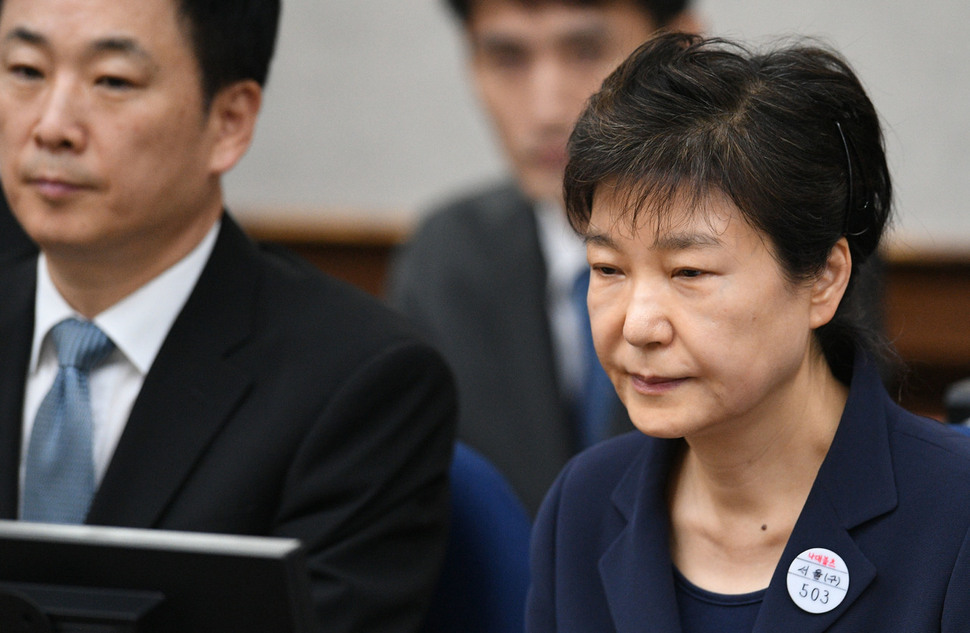 |
|
Ex-president Park Geun-hye awaits her trial at the Seoul Central District Court on May 23, 2017. (photo pool)
|
Ex-president remains in custody due to pending prison sentence for election law violation
The detention period for Park Geun-hye, whose trial in an influence-peddling scandal is currently being reviewed by the Supreme Court, came to an end on the evening of Apr. 16. The former South Korean president won’t be released from custody, however, because of a pending prison sentence she was given for meddling in candidate nominations by the Saenuri Party (today known as the Liberty Korea Party). With the Supreme Court’s full bench scheduled to hold its fourth hearing on Apr. 18 in the case, which involves Park, her former confidante Choi Soon-sil, and Samsung Electronics Vice Chairman Lee Jae-yong, some analysts believe the court could issue its verdict on Apr. 25. The trial detention period for Park has been extended a total of three times (October and November 2018 and February 2019) since her influence-peddling case was taken up by the Supreme Court this past September. Detention can be extended a maximum of three times, at intervals of two months, during the final appeal. Though her trial detention period has expired, Park will remain behind bars. She didn’t appeal a two-year prison sentence she received for violating the Public Official Election Act by meddling in the Saenuri Party’s candidate nominations, which meant that her sentence was confirmed in November 2018. As of the evening of Apr. 16, when the period of detention in her ongoing trial expired, Park’s official status changed from a prisoner awaiting conviction, still on trial, to a convicted prisoner, serving a prison sentence. In April 2018, a district court sentenced Park to a 24-year prison sentence and a fine of 18 billion won (US$15.86 million); in August of the same year, a high court gave her a stiffer sentence of 25 years in prison and a fine of 20 billion won (US$17.62 million). Ordinarily, convicts are transferred to a prison when beginning their sentence, but Park will remain at the Seoul Detention Center. “Since the trial is still underway, we have no plan to transfer her to a prison. She will wear the blue-green uniforms worn by convicted prisoners instead of the light-green uniforms worn by prisoners who are awaiting conviction,” said an official from the Ministry of Justice. In addition to her influence-peddling trial, Park also has another appeal pending: a district court convicted her of pocketing money from the National Intelligence Service’s special activity fund and sentenced her to six years in prison. Supreme Court to render verdict in influence-peddling trial on Apr. 25 Some expect that the Supreme Court will render its verdict in Park’s influence-peddling trial on Apr. 25. The final appeal for Park and the other defendants in the case, including Lee Jae-yong, was referred to the full bench of the Supreme Court on Feb. 11. Three hearings have already been held (on Feb. 21, Mar. 21 and Mar. 28), and the fourth hearing is scheduled for Apr. 18. Since cases involving Choi and Lee were already reviewed by the second and third panels of the Supreme Court before Park’s trial was taken on by the full bench, a substantial amount of progress has already been made on sorting out the disputed matters. That has led some to predict that the verdict will be announced on Apr. 25. The key question to be decided during the hearings before the Supreme Court is whether the money that Samsung provided Choi’s daughter Chung Yoo-ra to buy horses for her equestrian activity constituted a bribe. On appeal, the 3.6 billion won (US$3.17 million) given to Choi and Chung for equestrian purchases was subtracted from the amount of Lee’s bribes, leading to his release under a suspended sentence. But the high courts that presided over Park and Choi’s appeals included this in the amount of the bribery. By Choi Woo-ri, staff reporter Please direct comments or questions to [english@hani.co.kr]






